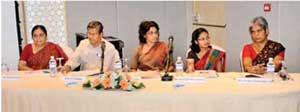Reply To:
Name - Reply Comment
 A majority of participants in an open forum called for restrictions on migration to countries which do not have strong bi-lateral agreements with Sri Lanka with regards to the safety and protection of rights of Sri Lankan migrant workers.
A majority of participants in an open forum called for restrictions on migration to countries which do not have strong bi-lateral agreements with Sri Lanka with regards to the safety and protection of rights of Sri Lankan migrant workers.
Organized by Friedrich Ebert Stiftung, a German political foundation associated with the Social Democratic Party of Germany, the forum discussed issues along the theme “Welcome Money, Unwelcome Issues? The Challenges of Sri Lankan Female Migrant Workers”.
“We have been discussing this very same issue for the last 40 years, yet almost nothing has changed! It’s not a question of whether or not these people should be allowed to migrate, we all have that right. The question really should be whether the migrations that are taking place are in line with the values enshrined in the Universal Declaration of Human,” Human Rights Activist and Chairperson of the International Movement Against All Forms of Discrimination and Racism (IMADR), Dr. Nimalka Fernando stated.
“Like men, women have the right to migrate but whilst we welcome the money that comes from their migration, we are clearly still not ready to deal with the issues that it raises, the first of which is the creeping slave-trade that we perpetuate by sending our women to countries which in addition to having a history of incidents of violations of Labour and Human rights,
lack strong bi-lateral agreements promoting labour rights,” Dr. Fernando stated.Pointing to the remittance-dependent nature of Sri Lanka’s economy, Dr. Fernando lashed out at Sri Lanka’s historic political culture of embracing remittances, which topped US$ 6 billion in 2012 providing significant support to the country’s balance of payments, whilst ignoring its responsibility to protect Sri Lankan citizens working overseas.
“Since 1982 all governments, including the present one, have stated as policy how much remittance the country received and yet failed to touch upon its implications or even the reasons that push its citizens into migrating, the primary cause being poverty. How is it possible that we are calling ourselves a middle-income country and yet migration is on the increase?”
“Whilst the causes of migration remain unaddressed, issues of violations of rights can only be dealt with in host countries and this is an issue being faced by many South Asian countries and not one that Sri Lanka can handle alone. We need a South Asian policy along with bi-lateral and SAARC agreement to protect our migrant workers and in the absence of such agreements, we must reconsider allowing migration to countries that violate our women’s rights because that is not really migration. It is long past time that we put policy into practice,” Dr. Fernando asserted.
Dr. Fernando’s views received wide acceptance amongst participants at the Forum, many of whom called for restrictions on migration along with a greater focus by the Sri Lankan government on the rights an aspirations of the island’s migrant population.
According to research based on interviews of housemaids in a shelter run by the Sri Lankan Embassy in Jordan, 99% of the 214 women who had fled their employers reported physical abuse, along with constant verbal abuse from employers.
“A majority of these women also reported sexual abuse however they were too afraid to even report these crimes to authorities because they felt they would not be believed. Several of them were not allowed contact with their homes because their phones were taken away from them by their employers. They were also denied medical attention including one woman who lost hearing in one ear after being repeatedly assaulted.” Head of the CounterTrafficking Unit of the International Organization of Migration, AnuradhiNavatratnamnoted.
A lack of resources in Sri Lankan diplomatic missions overseas, along with a lack of awareness of issues surrounding migration in Sri Lanka’s rural areas were cited as other factors exacerbating the problem by Coordinating Secretary to the Ministry of Labour, Padma Ratnayake.
“We need to increase the cadre of the labour divisions of our Diplomatic missions according to the magnitude of work in respective countries, especially female labour officers. We also need to create better awareness about what opportunities are available for them in Sri Lanka and the proper procedures and skills needed when migrating amongst those who don’t have ready access to this information” Ratnayake stated.
Sri Lanka’s embassy in Saudi-Arabia had only 4 employees in its labour division at the time of the execution of Rizana Nafeek, in comparison to the approximately 250,000 Sri Lankan migrant workers whom they are supposed to represent.